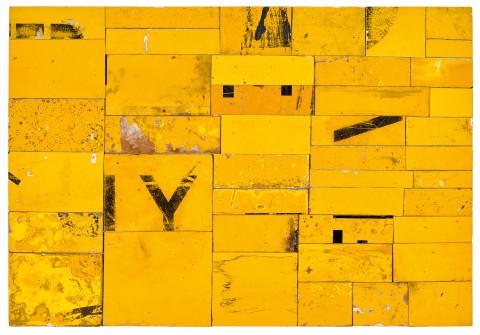LASSETER'S REEF, 1993/1996 – 97
ROSALIE GASCOIGNE
retro-reflective road sign on wood
84.0 x 122.0 cm
signed, dated and inscribed with title verso: Rosalie Gascoigne / 1996–97 / LASSETER’S REEF
Roslyn Oxley9 Gallery, Sydney (label attached verso)
Private collection, Sydney, acquired from the above in 1998
Christie’s, Sydney, 13 August 2000, lot 51
The Cbus Collection of Australian Art, Melbourne, acquired from the above
Rosalie Gascoigne, Roslyn Oxley9 Gallery, Sydney, 1 April – 2 May 1998, cat. 6
Toi Toi Toi, Three Generations of Artists from New Zealand, Museum Fridericianum, Kassel, Germany, 23 January – 5 April 1999; Auckland Art Gallery Toi o Tamaki, Auckland, New Zealand, 22 May – 4 July 1999, cat. 73
Colour and Movement, Benalla Art Gallery, Victoria, 19 February – 9 June 2016
on long term loan to Wollongong City Gallery, New South Wales
Toi Toi Toi, Three Generations of Artists from New Zealand, Auckland Art Gallery Toi o Tamaki, Auckland, 1998, cat. 73, p. 83 (illus.)
Nainby, B., Stanhope, Z., and Furlonger, K., The Cbus Collection of Australian Art, in association with Latrobe Regional Gallery, Melbourne, 2009, pp. 17, 168 (illus.), 219
Gascoigne, M., Rosalie Gascoigne. A Catalogue Raisonné, ANU Press, Canberra, 2019, cat. 614, pp. 124, 296 (illus.), 416
Lasseter’s Reef, 1993/1996 – 97 glimmers with the numinous energy that Rosalie Gascoigne was able to summon from her materials and alludes to a mirage, the contemporary tall tale from which it derives its title. Rosalie Gascoigne’s art was deeply informed by the geographic features of her adoptive Australian homeland and followed a progression of formal and abstract distillation. Her works were all anchored in the aesthetic qualities of her found materials and their poetic associative power. Often the origin and function of her found objects was completely obscured by the artist’s process of alteration, fragmentation and reconstitution.
Lasseter’s Reef is amongst a handful of works within Gascoigne’s oeuvre that directly reference their own retro-reflective surface, honouring the creative and poetic potential that was concealed in their original function as road-signs. In appropriating the arresting blaze required for safety in street signage to evoke the enticing (but ultimately unreliable) glimmer of treasure and fame, Gascoigne created tongue-in-cheek works with names such as Flash Art, 1987; All that Glisters, 1989; Fool’s Gold, 1992 (National Gallery of Australia); Danegeld, 1995, and the present Lasseter’s Reef. This last work was initially conceived in 1993 (as photographs of the artist’s studio have recorded), before being reworked into its final form in May 1997 prior to the artist’s antepenultimate solo exhibition at Roslyn Oxley in April 1998. The title that was applied to the final product refers to a vast mythical quartz and gold vein that Harold Bell Lasseter claimed to have found in Central Australia in 1897, before perishing on a subsequent prospecting expedition to the area in 1930. His story persisted as a famous Australian folktale throughout the mid twentieth century.
This planar assemblage is almost entirely abstract, founded on the rhythm and order of a tessellated Modernist grid. The rigour of this arrangement is disrupted by the irregularities of her found materials. Although arrestingly bright, the shine and yellow hue of Lasseter’s Reef is not uniform. The variations in the wear and tear of each fragment of signage produce a dappled monochromatic surface that pays homage to the element on which Australia built its wealth, while also being “a warning and a promise, that is, of man’s ability to degrade the land and to create beauty”.1 As the celebrated art critic Sebastian Smee noted at the time in his review of the original exhibition: “these works are about the solidly real and transitory all at once”.2 The artist herself placed mystical meaning in the visual effects of this transient shimmer, in the same year explaining: “I don’t think you want the solid shine so that it always shines […] It is a terribly good omen to see a shine coming out of a picture and then it just sulks, and the sun goes around”.3
1. Mary Eagle, notes, National Gallery of Australia 1993, cited in Edwards, D., Rosalie Gascoigne: Material as Landscape, Art Gallery of New South Wales, Sydney, 1997, p. 15
2. Smee, S., ‘The Prime of Rosalie Gascoigne’, Sydney Morning Herald, Sydney, 2 April 1998, p. 11
3. The artist, 1998, quoted in, Gascoigne, M., Rosalie Gascoigne. A Catalogue Raisonné, ANU Press, Canberra, 2019, p. 277
LUCIE REEVES-SMITH
